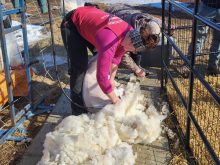PRINCE GEORGE, B.C. – Public education about what happens on farms and ranches is a business investment, says the head of the British Columbia Farm Animal Care Council.
“This is your life, it is not just a job,” council manager Geraldine Auston told the B.C. Cattlemen’s Association’s recent annual meeting in Prince George.
“It is your turn to tell your story about what is happening on your farms. You can’t let people say what you are doing on your behalf.”
Read Also

Charges laid after cattle theft
Saskatchewan RCMP lay two charges against a man after six cattle went missing.
The council was formed two years ago with funding from Agriculture Canada and the Investment Agriculture Foundation of B.C. It is aligned with similar groups in Alberta, Saskatchewan and Ontario as well as a national organization.
The BCCA is a member of the B.C. council.
Auston said livestock and poultry producers need to be more vocal about what is done on their farms because telling these stories is an investment in the farm.
“The more they don’t understand, the more at threat your farms and ranches are,” she said.
Auston warned cattle producers that recent attack ads and animal rights websites are targeting livestock practices.
The Vancouver Humane Society recently posted such information, although she did not know how widely read it was.
For example, www.raisingthebarn.ca has spoken out against calf roping at rodeos and promotes little or no meat consumption.
“We are letting those groups go forward and communicating what they want. We can say they are wrong but nobody does anything,” Auston said.
“These people are very passionate about what they do, but you are very passionate about what you do.”
The council has developed a livestock emergency response plan, an equine emergency program and a care line at 877-828-5486 for producers to call before a welfare situation gets out of control.
Certified livestock hauling training was offered before the council was formed and more is coming. About 100 truckers have been trained.
Livestock handling and behaviour courses are available and a media strategy has been created.
The council is planning its first conference Nov. 10 in Abbotsford. Information will be posted at www.bcfacc.ca.

















